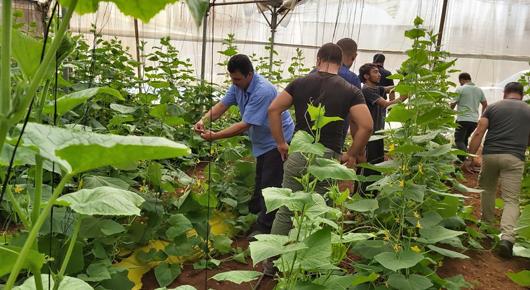Prospering the potential of cucumber cultivation by participation in knowledge sharing through Farmer Field Schools in Palestine.

Basem collecting his cucumbers harvest along with other members of his community in A’aba, October 2020. ©FAO/Ayman Al Alem
Living in in A’aba village that lies on the west of Jenin, Palestine, Basem is the breadwinner for his wife and four children, out of which two are university students. Like the rest of Palestinians, Basem and the rest of the farmers in his community struggle with the high cost of irrigation water threatening the continuation of their farming practices despite the availability of land and fertile soil.
Farmer Field Schools (FFS) have been identified under the Water Productivity (WP) component of the regional project ‘Implementing the 2030 Agenda for water efficiency/productivity and water sustainability in NENA countries’, as a key activity to increase and enhance water productivity. Within this activity, Basem and 16 other farmers who own greenhouses cultivated with cucumbers, were trained on good agricultural practices to increase water productivity and efficiency in irrigation. To evaluate the intervention, one greenhouse belonging to a farmer who has joined the FFS was compared with another greenhouse that was not included in the intervention; the result of this comparison showed that the returned income went up by 42 percent. This reflects that the potential in cucumber cultivation can be capitalized on by tackling the water management aspect to improve the livelihoods of many farmers in A’aba and their families.
In terms of production, Basem produced 10 100 kilograms compared to 8 000 kilograms before the intervention. This has reflected on a significant increase in his income to go up from ILS 5 000 (around 1 465 USD) per month to ILS 8000 (around 2 345 USD). Covering his family’s needs at his initial income was highly challenging, however, Basem can now afford to allocate the extra income he gains for his daughter’s tuition fees who enrolled to study medicine.
Basem describes his experience of being part of the FFS as rewarding on all levels. Farmers have the chance not only to receive direct technical trainings and capacity building, but also they get the chance to share each other’s experiences and knowledge. This has reduced the tension caused by water shortage within farmers and has reflected positively on the community of famers in A’aba at a level where they are able to enhance their businesses and the livelihoods of their families.
This activity is under the regional project ‘Implementing the 2030 Agenda for water efficiency/productivity and water sustainability in NENA countries’, implemented by the Food and Agriculture Organization of the United Nations and funded by the Swedish International Development Cooperation Agency.
